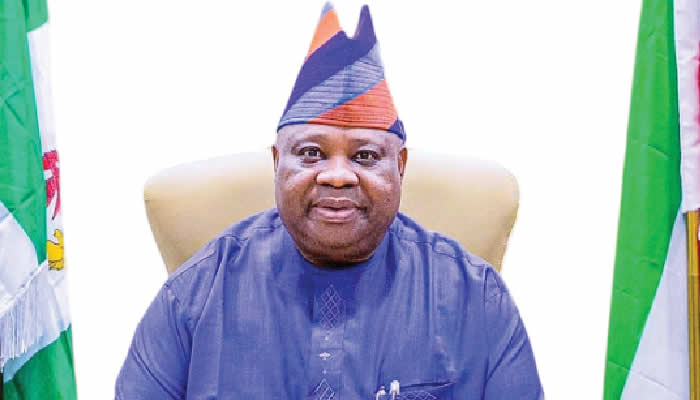The political landscape of Osun State is abuzz with speculation surrounding the future allegiance of Governor Ademola Adeleke, fueled by rumors of a potential defection to the All Progressives Congress (APC). A prominent caucus within the state chapter of the Peoples Democratic Party (PDP), Adeleke’s current party, has convened a meeting to address these swirling rumors and solidify their position. The outcome of this meeting, as communicated through a statement released by the governor’s spokesperson, Olawale Rasheed, indicates a firm resolve by the caucus to remain aligned with Adeleke, regardless of his ultimate political decision. This declaration of unwavering support underscores the governor’s significant influence within the party and foreshadows potential realignments in the state’s political landscape.
The caucus meeting, presided over by Governor Adeleke himself, brought together a diverse and influential group of PDP stakeholders. Among those present were Deputy Governor Kola Adewusi, Deputy Senate Minority Leader Lere Oyewumi, members of the House of Representatives, the PDP’s South West Vice Chairman, the Osun PDP chairman, the Speaker and Deputy Speaker of the Osun State House of Assembly, key members of the governor’s administration, former Governor Olagunsoye Oyinlola, and Senator Oluwole Alabi. This broad representation signifies the weight of the caucus’s decision and suggests a widespread consensus within the party’s ranks. The collective presence of these leaders demonstrates the gravity of the situation and highlights the potential ramifications of Adeleke’s decision.
The statement released after the meeting emphasizes the comprehensive nature of the discussions and the inclusive participation of various party factions. It specifically mentions the presence of representatives from the National Assembly caucus, the State Assembly caucus, the State Executive Council, the State Executive of the party, the Special Advisers’ Forum, the elders caucus, and the state chapter of the Association of Local Governments of Nigeria (ALGON) leadership. This meticulous detailing of the attendees reinforces the notion that the decision to support Adeleke was not taken lightly but rather emerged from a thorough and representative deliberation process.
The core message of the communique emanating from the meeting is unambiguous: the Osun State PDP leadership stands united in its commitment to follow Governor Adeleke’s lead, regardless of his political path. This declaration effectively gives Adeleke a mandate to chart the course for the state party, placing immense power in his hands. While the statement acknowledges that Adeleke is still engaged in consultations both locally and nationally, the caucus’s unwavering support strengthens his bargaining position and adds considerable weight to his considerations.
The caucus’s decision to publicly declare their allegiance to Adeleke carries profound implications for the Osun State political landscape. It not only underscores the governor’s influence within the PDP but also suggests a potential shift in the state’s power dynamics. Should Adeleke decide to defect to the APC, the caucus’s commitment could lead to a significant exodus of PDP members, potentially reshaping the balance of power in the state. This unwavering support could also serve as a powerful motivator for other PDP members to align themselves with Adeleke’s chosen direction, further solidifying his influence.
In conclusion, the Osun State PDP caucus’s declaration of support for Governor Adeleke represents a pivotal moment in the state’s political landscape. It signals a potential realignment of political forces and highlights the governor’s significant influence within the party. While the governor’s ultimate decision remains unknown, the caucus’s commitment to follow his lead adds a layer of complexity to the situation and creates a sense of anticipation regarding the future of Osun State politics. This public display of loyalty not only empowers Adeleke but also sets the stage for potential shifts in party affiliations and power dynamics within the state.


